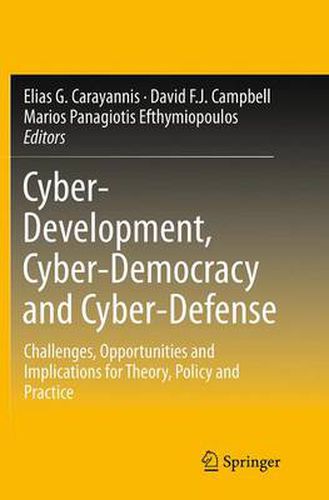Readings Newsletter
Become a Readings Member to make your shopping experience even easier.
Sign in or sign up for free!
You’re not far away from qualifying for FREE standard shipping within Australia
You’ve qualified for FREE standard shipping within Australia
The cart is loading…






This title is printed to order. This book may have been self-published. If so, we cannot guarantee the quality of the content. In the main most books will have gone through the editing process however some may not. We therefore suggest that you be aware of this before ordering this book. If in doubt check either the author or publisher’s details as we are unable to accept any returns unless they are faulty. Please contact us if you have any questions.
In this volume, contributors from academia, industry, and policy explore the inter-connections among economic development, socio-political democracy and defense and security in the context of a profound transformation, spurred by globalization and supported by the rapid development of information and communication technologies (ICT). This powerful combination of forces is changing the way we live and redefining the way companies conduct business and national governments pursue strategies of innovation, economic growth and diplomacy.
Integrating theoretical frameworks, empirical research and case studies, the editors and contributors have organized the chapters into three major sections, focusing on cyber-development, cyber-democracy and cyber-defense.
The authors define cyber-development as a set of tools, methodologies and practices that leverage ICT to catalyze and accelerate social, political and economic development, with an emphasis on making the transition to knowledge-based economies. One underlying understanding here is that knowledge, knowledge creation, knowledge production and knowledge application (innovation) behave as crucial drivers for enhancing democracy, society, and the economy. By promoting dissemination and sharing of knowledge, cyber-democracy allows a knowledge conversion of the local into the global (gloCal) and vice versa, resulting in a gloCal platform for communication and knowledge interaction and knowledge enhancement. Meanwhile, technology-enabled interconnectivity increases the need to adopt new methods and actions for protection against existing threats and possible challenges to emerge in the future. The final section contemplates themes of cyber-defense and security, as well as emerging theories and values, legal aspects and trans-continental links (NATO, international organizations and bilateral relations between states). Collectively, the authors present a unique collection of insights and perspectives on the challenges and opportunities inspired by connectivity.
$9.00 standard shipping within Australia
FREE standard shipping within Australia for orders over $100.00
Express & International shipping calculated at checkout
This title is printed to order. This book may have been self-published. If so, we cannot guarantee the quality of the content. In the main most books will have gone through the editing process however some may not. We therefore suggest that you be aware of this before ordering this book. If in doubt check either the author or publisher’s details as we are unable to accept any returns unless they are faulty. Please contact us if you have any questions.
In this volume, contributors from academia, industry, and policy explore the inter-connections among economic development, socio-political democracy and defense and security in the context of a profound transformation, spurred by globalization and supported by the rapid development of information and communication technologies (ICT). This powerful combination of forces is changing the way we live and redefining the way companies conduct business and national governments pursue strategies of innovation, economic growth and diplomacy.
Integrating theoretical frameworks, empirical research and case studies, the editors and contributors have organized the chapters into three major sections, focusing on cyber-development, cyber-democracy and cyber-defense.
The authors define cyber-development as a set of tools, methodologies and practices that leverage ICT to catalyze and accelerate social, political and economic development, with an emphasis on making the transition to knowledge-based economies. One underlying understanding here is that knowledge, knowledge creation, knowledge production and knowledge application (innovation) behave as crucial drivers for enhancing democracy, society, and the economy. By promoting dissemination and sharing of knowledge, cyber-democracy allows a knowledge conversion of the local into the global (gloCal) and vice versa, resulting in a gloCal platform for communication and knowledge interaction and knowledge enhancement. Meanwhile, technology-enabled interconnectivity increases the need to adopt new methods and actions for protection against existing threats and possible challenges to emerge in the future. The final section contemplates themes of cyber-defense and security, as well as emerging theories and values, legal aspects and trans-continental links (NATO, international organizations and bilateral relations between states). Collectively, the authors present a unique collection of insights and perspectives on the challenges and opportunities inspired by connectivity.